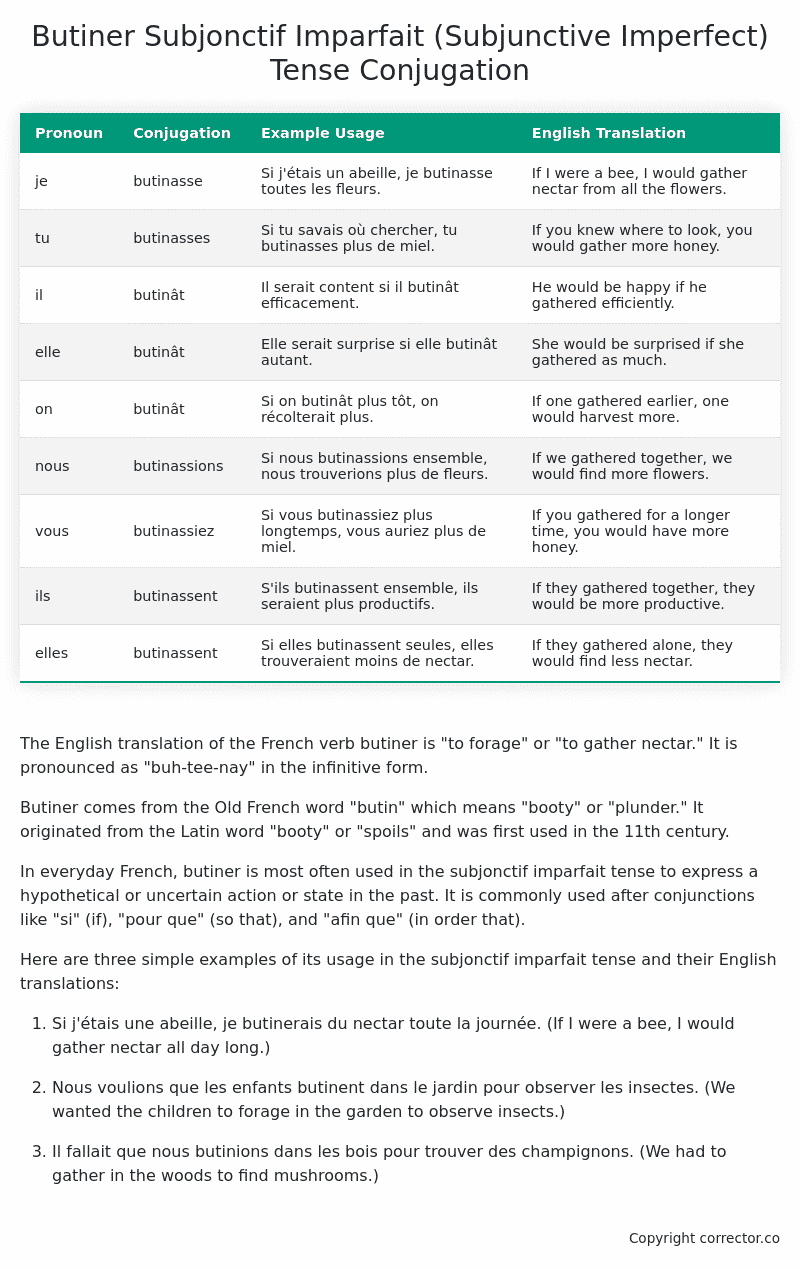Subjonctif Imparfait (Subjunctive Imperfect) Tense Conjugation of the French Verb butiner
Introduction to the verb butiner
The English translation of the French verb butiner is “to forage” or “to gather nectar.” It is pronounced as “buh-tee-nay” in the infinitive form.
Butiner comes from the Old French word “butin” which means “booty” or “plunder.” It originated from the Latin word “booty” or “spoils” and was first used in the 11th century.
In everyday French, butiner is most often used in the subjonctif imparfait tense to express a hypothetical or uncertain action or state in the past. It is commonly used after conjunctions like “si” (if), “pour que” (so that), and “afin que” (in order that).
Here are three simple examples of its usage in the subjonctif imparfait tense and their English translations:
-
Si j’étais une abeille, je butinerais du nectar toute la journée. (If I were a bee, I would gather nectar all day long.)
-
Nous voulions que les enfants butinent dans le jardin pour observer les insectes. (We wanted the children to forage in the garden to observe insects.)
-
Il fallait que nous butinions dans les bois pour trouver des champignons. (We had to gather in the woods to find mushrooms.)
Table of the Subjonctif Imparfait (Subjunctive Imperfect) Tense Conjugation of butiner
| Pronoun | Conjugation | Example Usage | English Translation |
|---|---|---|---|
| je | butinasse | Si j’étais un abeille, je butinasse toutes les fleurs. | If I were a bee, I would gather nectar from all the flowers. |
| tu | butinasses | Si tu savais où chercher, tu butinasses plus de miel. | If you knew where to look, you would gather more honey. |
| il | butinât | Il serait content si il butinât efficacement. | He would be happy if he gathered efficiently. |
| elle | butinât | Elle serait surprise si elle butinât autant. | She would be surprised if she gathered as much. |
| on | butinât | Si on butinât plus tôt, on récolterait plus. | If one gathered earlier, one would harvest more. |
| nous | butinassions | Si nous butinassions ensemble, nous trouverions plus de fleurs. | If we gathered together, we would find more flowers. |
| vous | butinassiez | Si vous butinassiez plus longtemps, vous auriez plus de miel. | If you gathered for a longer time, you would have more honey. |
| ils | butinassent | S’ils butinassent ensemble, ils seraient plus productifs. | If they gathered together, they would be more productive. |
| elles | butinassent | Si elles butinassent seules, elles trouveraient moins de nectar. | If they gathered alone, they would find less nectar. |
Other Conjugations for Butiner.
Le Present (Present Tense) Conjugation of the French Verb butiner
Imparfait (Imperfect) Tense Conjugation of the French Verb butiner
Passé Simple (Simple Past) Tense Conjugation of the French Verb butiner
Passé Composé (Present Perfect) Tense Conjugation of the French Verb butiner
Futur Simple (Simple Future) Tense Conjugation of the French Verb butiner
Futur Proche (Near Future) Tense Conjugation of the French Verb butiner
Plus-que-parfait (Pluperfect) Tense Conjugation of the French Verb butiner
Passé Antérieur (Past Anterior) Tense Conjugation of the French Verb butiner
Futur Antérieur (Future Anterior) Tense Conjugation of the French Verb butiner
Subjonctif Présent (Subjunctive Present) Tense Conjugation of the French Verb butiner
Subjonctif Passé (Subjunctive Past) Tense Conjugation of the French Verb butiner
Subjonctif Imparfait (Subjunctive Imperfect) Tense Conjugation of the French Verb butiner (this article)
Subjonctif Plus-que-parfait (Subjunctive Pluperfect) Tense Conjugation of the French Verb butiner
Conditionnel Présent (Conditional Present) Tense Conjugation of the French Verb butiner
Conditionnel Passé (Conditional Past) Tense Conjugation of the French Verb butiner
L’impératif Présent (Imperative Present) Tense Conjugation of the French Verb butiner
L’infinitif Présent (Infinitive Present) Tense Conjugation of the French Verb butiner
Struggling with French verbs or the language in general? Why not use our free French Grammar Checker – no registration required!
Get a FREE Download Study Sheet of this Conjugation 🔥
Simply right click the image below, click “save image” and get your free reference for the butiner Subjonctif Imparfait tense conjugation!

Butiner – About the French Subjonctif Imparfait (Subjunctive Imperfect) Tense
Formation
Common Everyday Usage Patterns
Interactions with Other Tenses
Subjonctif Présent
Indicatif Passé Composé
Conditional
Conditional Perfect
Summary
I hope you enjoyed this article on the verb butiner. Still in a learning mood? Check out another TOTALLY random French verb conjugation!


